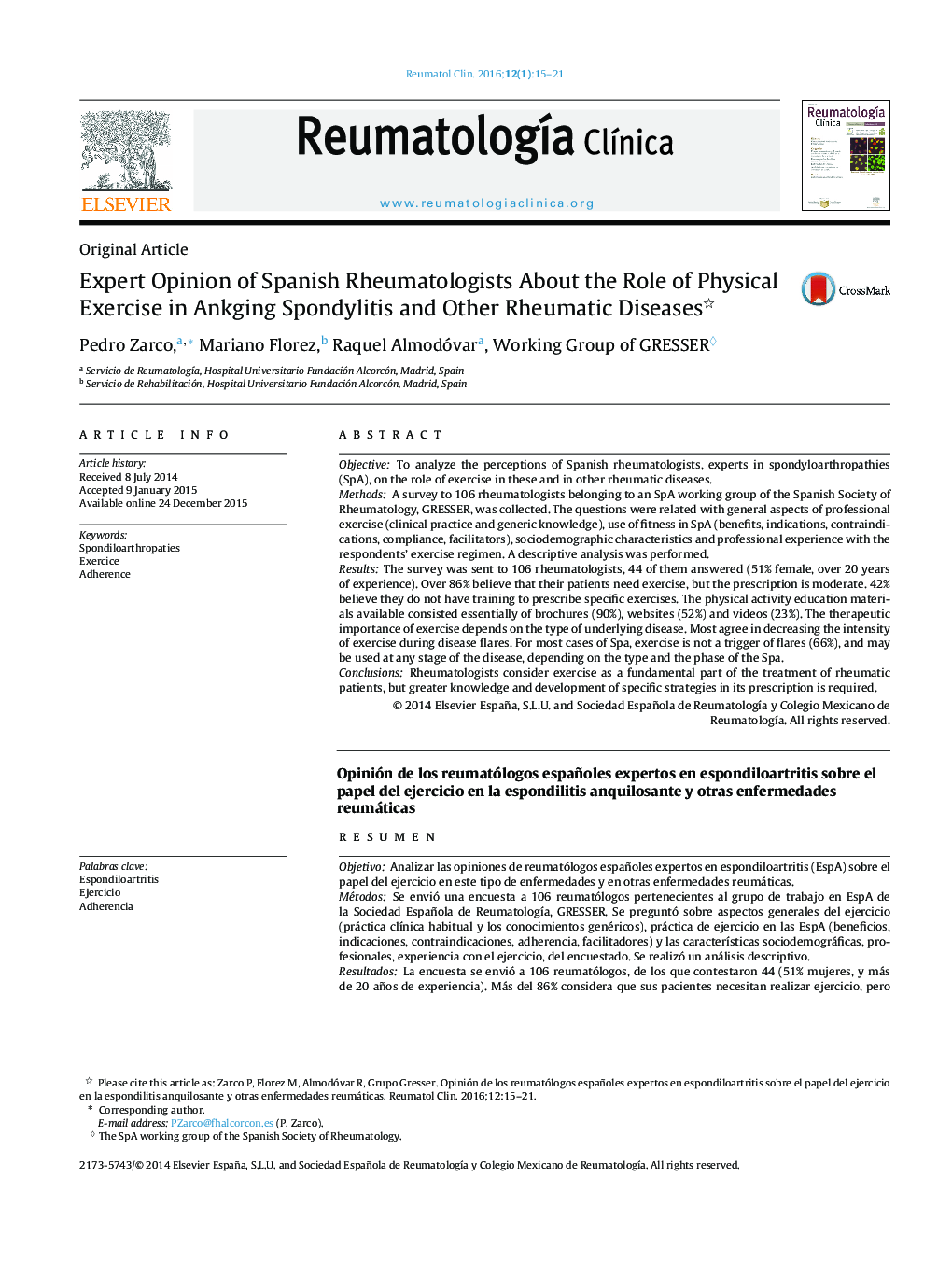| کد مقاله | کد نشریه | سال انتشار | مقاله انگلیسی | نسخه تمام متن |
|---|---|---|---|---|
| 3384119 | 1220512 | 2016 | 7 صفحه PDF | دانلود رایگان |
ObjectiveTo analyze the perceptions of Spanish rheumatologists, experts in spondyloarthropathies (SpA), on the role of exercise in these and in other rheumatic diseases.MethodsA survey to 106 rheumatologists belonging to an SpA working group of the Spanish Society of Rheumatology, GRESSER, was collected. The questions were related with general aspects of professional exercise (clinical practice and generic knowledge), use of fitness in SpA (benefits, indications, contraindications, compliance, facilitators), sociodemographic characteristics and professional experience with the respondents’ exercise regimen. A descriptive analysis was performed.ResultsThe survey was sent to 106 rheumatologists, 44 of them answered (51% female, over 20 years of experience). Over 86% believe that their patients need exercise, but the prescription is moderate. 42% believe they do not have training to prescribe specific exercises. The physical activity education materials available consisted essentially of brochures (90%), websites (52%) and videos (23%). The therapeutic importance of exercise depends on the type of underlying disease. Most agree in decreasing the intensity of exercise during disease flares. For most cases of Spa, exercise is not a trigger of flares (66%), and may be used at any stage of the disease, depending on the type and the phase of the Spa.ConclusionsRheumatologists consider exercise as a fundamental part of the treatment of rheumatic patients, but greater knowledge and development of specific strategies in its prescription is required.
ResumenObjetivoAnalizar las opiniones de reumatólogos españoles expertos en espondiloartritis (EspA) sobre el papel del ejercicio en este tipo de enfermedades y en otras enfermedades reumáticas.MétodosSe envió una encuesta a 106 reumatólogos pertenecientes al grupo de trabajo en EspA de la Sociedad Española de Reumatología, GRESSER. Se preguntó sobre aspectos generales del ejercicio (práctica clínica habitual y los conocimientos genéricos), práctica de ejercicio en las EspA (beneficios, indicaciones, contraindicaciones, adherencia, facilitadores) y las características sociodemográficas, profesionales, experiencia con el ejercicio, del encuestado. Se realizó un análisis descriptivo.ResultadosLa encuesta se envió a 106 reumatólogos, de los que contestaron 44 (51% mujeres, y más de 20 años de experiencia). Más del 86% considera que sus pacientes necesitan realizar ejercicio, pero su prescripción es moderada. El 42% no tienen formación para la prescripción de ejercicios concretos. El material educativo sobre actividad física disponible consiste fundamentalmente en folletos (90%), páginas web (52%) y vídeos (23%). La importancia terapéutica del ejercicio depende del tipo y de la enfermedad de base. La mayoría coincide en disminuir la intensidad del ejercicio en los brotes de la enfermedad. Para la mayoría, en las EspA el ejercicio no es un factor desencadenante de brotes (66%) y debe utilizarse en cualquier fase de la enfermedad, el tipo depende de la fase de la EspA.ConclusionesLos reumatólogos consideran el ejercicio una parte fundamental del tratamiento de los pacientes reumáticos, aunque se precisa un mayor conocimiento y desarrollo de estrategias específicas de prescripción del ejercicio en Reumatología.
Journal: Reumatología Clínica (English Edition) - Volume 12, Issue 1, January–February 2016, Pages 15–21
